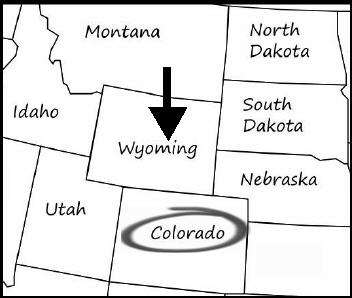It is currently illegal for first cousins to marry in Wyoming.
First cousins once removed and other more distant relationships are allowed to marry.
This article reviews the important aspects of cousin marriage within the Cowboy State.
What Do The Wyoming Marriage Laws Say About First Cousins?
The Wyoming marriage laws describe a range of relationships that are prohibited.
We’ve broken up the text below to make it clearer.
[marriage is illega]…when the parties stand in the relation to each other of parent and child, grandparent and grandchild, brother and sister of half or whole blood, uncle and niece, aunt and nephew,
or first cousins,
whether either party is illegitimate. This paragraph does not apply to persons not related by consanguinity
Wyoming marriage laws
What does “of half or whole blood” mean?
Let’s quickly explain the bit about “half” and “whole blood”. When two siblings share the same parents, they are whole blood relatives. This is what we usually call full siblings.
When the siblings only share one parent, we call them half siblings in normal conversation. This is also known as a half blood relationship.
The children of full siblings are first cousins. The children of half siblings are half first cousins.
If that seems confusing, then you can see a diagram in our companion article that describes what a half first cousin is.
Are half first cousins allowed?
So, does Wyoming allow marriage between half first cousins?
The way it’s worded makes it seem like the full or half distinction only applies to brothers and sisters.
However, if you are concerned about this, we advise you to consult an attorney.
What does consanguinity mean?
Consanguinity means related by blood. This is in contrast with relationships through marriage or through adoption.
Has the ban always been in place?
Wyoming introduced its ban on first cousin marriages in the 1860s.
Are there any exceptions to the laws?
Some other states generally don’t allow first cousin marriage but have some allowances based on age or other criteria.
In contrast, Wyoming has a blanket ban within the state. There are no special exceptions.

Types Of Cousins That Can Get Married In Wyoming
Relationships that are further out than first cousins are allowed.
This means that first cousins once removed can marry in the state.
Of course, more distant cousins are also permitted.
If you’re not sure what the difference is between the various relationships, the links below will give you diagrams and clear explanations.
- first cousins once removed (children of your first cousins)
- second cousins explained (parents are first cousins)
- third cousins explained
- fourth cousins explained
Does The Wyoming Marriage Application Form Ask If You’re Related?
Some U.S. states have a section in their marriage application forms where the couple must state whether they have a blood relationship.
You can see an example in our article on whether first cousins can marry in Georgia.
We reviewed the application form for a marriage license in Wyoming in 2022. There is no such question present.
I point this out because I can see how people could get married without being aware of the impediment. However, when you sign the form you are affirming that there is no impediment to your marriage.
Do Nearby States Allow First Cousins To Marry?
Wyoming is bordered by Colorado, Idaho, Montana, South Dakota, and Utah. The Centennial State is the only one that allows first cousins to marry.
You can check out our article on first cousin marriage in Colorado.

Looking for a destination wedding spot?
Do you live in a state or country where first cousin marriage is legal and you simply wanted to visit Wyoming as a destination wedding spot?
Consider Colorado as an alternative option for your wedding venue!
Looking to relocate?
Some first cousins choose to relocate permanently to a state where their marriage will be legal.
Review your options and future plans carefully. You may wish to sit down with an attorney to consider all the implications.
Some states in the U.S. will not recognize legal marriages from other states.
Roman Catholic Marriages
Even if close cousins move to another state that allows their civil marriage, they will face separate hurdles if they want a wedding in a Roman Catholic church.
Historically, the Catholic Church hasn’t encouraged first cousin marriages. However, the church laws have been relaxed somewhat in recent years.
There is a process that first cousins need to go through with the hierarchy in order to get permission to marry in a church ceremony. This is known as a dispensation.
You can read a more detailed explanation here on how first cousins can have a Catholic wedding.
What about other cousins?
Second cousins (and further out) don’t need to get special permission for a Catholic Church marriage.
We suggest that you mention to your priest that you are second cousins before the service. This means he won’t get uneasy if he hears mention of “cousins” from other people.
If you’re not sure about whether you are first or second cousins, check out our article that explains how second cousins work. The infographics should make it understandable.
Frequently Asked Questions
Here are some quick answers to common questions.
Does Wyoming allow relatives to marry?
Wyoming does not allow close relatives to marry.
More distant relatives such as second cousins are allowed to marry in the state.
Can you marry a sibling in Wyoming?
Wyoming does not allow siblings to marry. Half-siblings are also not allowed to marry in the state.
Is it legal to marry your second cousin in Wyoming?
Marriage between second cousins is legal in Wyoming.
Disclaimer
The codes and laws referenced in this article may not be the most recent version. Wyoming may have more current or accurate information.
We make no warranties or guarantees about the accuracy, completeness, or adequacy of the information contained on this site or the information linked to on other sites. Please check official sources.